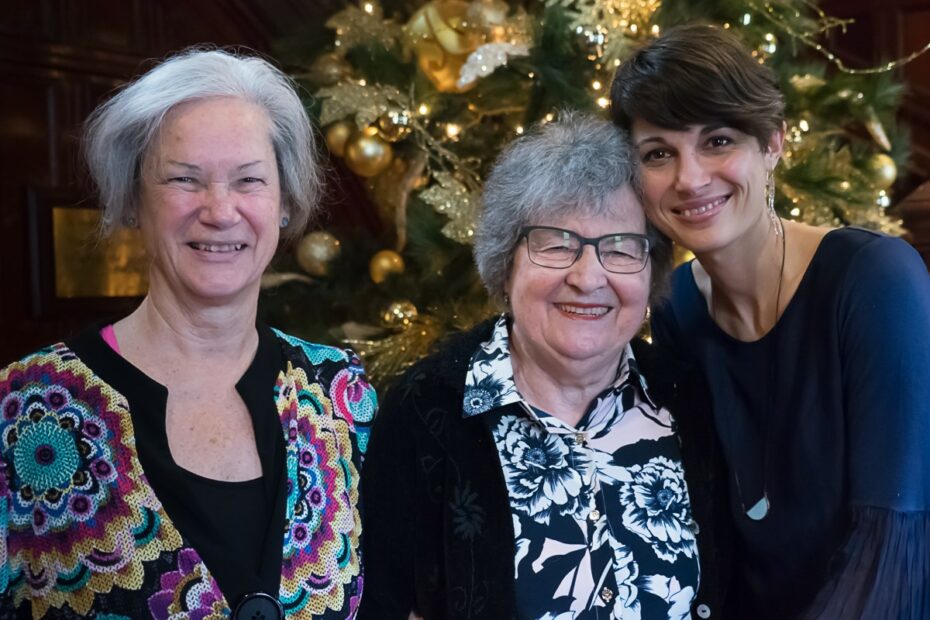
Callers to the Let’s Go radio show poured on the accolades: “awesome,” “a pleasure to work with,” “caring,” “a one-woman army,” “compassionate,” “a team player,” “empathetic” and “sensitive.”
The recipient of the effusive praise was Ana Milic, program administrator of the McGill Community for Lifelong Learning (MCLL), who was named Montrealer of the Month by the CBC Radio program for making sure the University’s most senior students made a smooth transition to virtual learning when COVID-19 drove everything online.
Milic oversees the McGill program administered by the School of Continuing Studies (SCS) that offers “retired learners,” all of them over 65 years of age, a wealth of courses, between 30 and 50 new courses each semester. This is in addition to the 30 to 50 one-time lectures presented every semester (see the full list of courses MCLL offers online).
Between 500 and 600 students enrol each fall, 400 to 500 in winter and spring and between 300 and 400 for summer sessions.
Digital literacy campaign
Milic is particularly proud that barely four weeks after the pandemic lockdown began on March 12, 2020, the MCLL had migrated an entire pilot program online.
“About 200 people registered for that first online Zoom program, filling up all 15 courses offered,” she says.
Organizers soon realized they needed to hire a cohort of hosts for the courses who were tech savvy, so that moderators could concentrate on teaching.
“Without judging or generalizing, some seniors struggle with technology,” Milic said. “So, the hosts contact every member (student) and do everything for them – check their bandwidth, teach them how to use Zoom, stay in touch with them on the phone.”
That became in effect a McGill mini-digital literacy campaign for seniors, who were greatly appreciative.
Students used funds from the McGill Sustainability Projects Fund to refurbish computers for some members – and some students donated computers to those who did not have one.
Strength in community
There have been heartaches along the way, largely COVID-19 related.
“We’ve lost a lot of members in the past year, more than usual,” said Milic. “It was really heart-breaking.”
“But these people are beyond resilient. It’s not just about intellectual stimulation, it really is a community. Away from study groups, there are social gatherings at least once a month. It’s a mutual-aid network. It’s so much more than ‘take a course and disconnect’. They deliver groceries, they call each other, stay in touch.”
“There’ve been some relationships. Some fell in love and are couples. They started initiatives like a book club, the Bloomsday Festival (celebrating James Joyce and first launched in Montreal by MCLL in 2012).
“It’s a real family.”
Peer-to-peer learning
“What’s exciting about that is that it’s peer-to-peer learning, and it’s always interest-led,” said Milic.
McGill’s lifelong learning courses are peer-led from a pool of over 1,000 active volunteers, many of them former McGill professors or students and covering a wide range of subjects, including literature, history, philosophy, music and science.
Some have dual roles, as both moderator – Milic shuns the word ‘instructor’ for its implication of an obey-and-command structure – and student/member.
“They both teach and learn.”
Mental stimulation – and no exams
Milic, who holds a B.Ed. from the University of Belgrade in her native Serbia, is also pursuing a double major in Interdisciplinary Studies in Sexuality and in Women’s Studies at Concordia’s Simone de Beauvoir Institute.
She became the only paid employee at MLCC in 2009 “to provide continuity,” shortly after starting to work there part-time.
Until then, seniors volunteered but “obviously couldn’t work five days a week. One person worked in the morning, another in the afternoon, and then a third and a fourth. So, McGill was fine with creating a full-time paid position.”
“My job is to support MCLL students and coordinate volunteers, be a resource person and adviser to the [13 MCLL board members and 12 office volunteers] and act as liaison with SCS. I need to make sure the program fits into the university structure, guidelines and objectives, but also to allow us creativity and freedom.”
The program is not career-oriented. Members are typically retired – 70 per cent of them women – who simply want to keep learning to remain intellectually active and for the sheer fun of it – and there are no exams.
The community outreach program is central to the overall SCS mission to build bridges beyond the university to various communities, offering “adult learners a path of life-long professional and personal transformation through innovative teaching, practical experience, and applied research” (see the SCS mission statement below).
You can read the SCS mission statement here: https://www.mcgill.ca/continuingstudies/mission-and-vision
